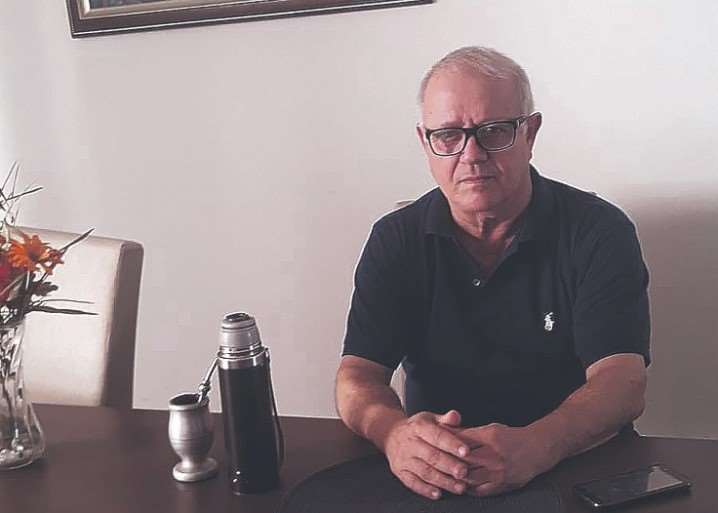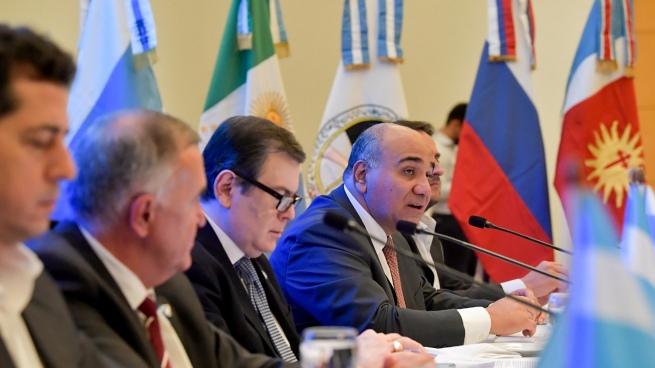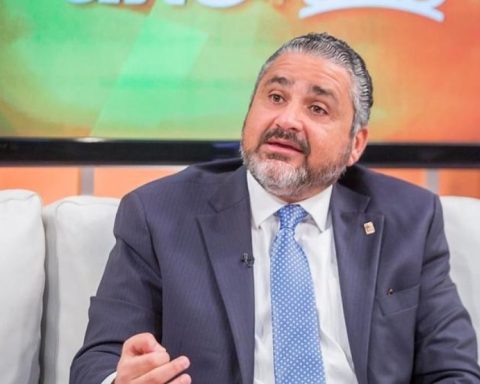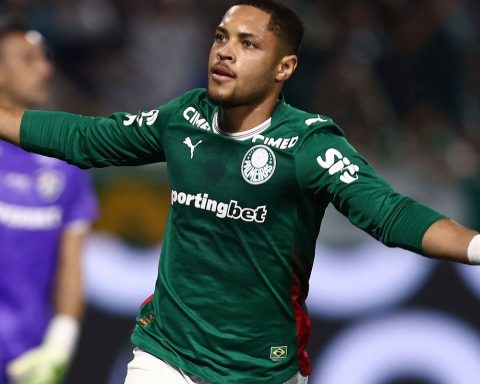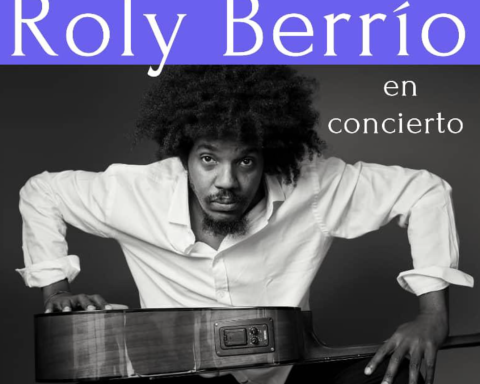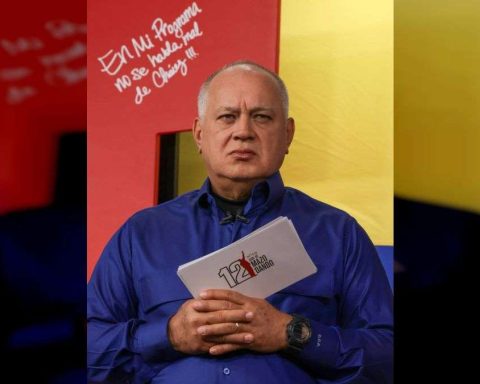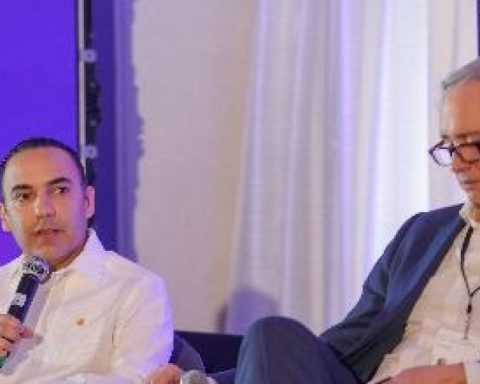July 4, 2022, 10:56 PM
July 4, 2022, 10:56 PM
CCarlos Enrique Huguenet is an Argentine who marked an era in Blooming and left a good memory in Oriente Petrolero. He is not one of the long list of foreigners who came to this land. On the contrary, he has a place among the most outstanding of all time.
Who did not enjoy Lalo Huguenet’s football?
He is one of the architects of the great change that Blooming experienced in the mid-70s. Together with Daniel Castro, another Argentine, his partner on the court, they gave the academy greater popularity in his return to the foreground after his first hard experience in the descent.
“Blooming was a blast. There is a photo in which the preference gallery had eighty percent women, it was awesome. The fireworks were sold out ”, recalls that once short midfielder, with a short forward dribbling, who piled up rivals and endured the intimidating mark of the goalkeepers of the time.
Today, last Friday actually, he is sitting in front of us telling his story, thanks to the social networks that allowed him to be traced and find his whereabouts after several decades.
Many wondered, what will Huguenet’s life be like? We checked it several times. And there he is, having a coffee, accompanied by his son Carlos, who collaborated to make this note possible.
Huguenet arrived in 1976 in a “friendly” city that opened the doors to the visitor and gave him the opportunity to write his story in football, in addition to starting a new stage in life. He was 23 years old when the remembered stepped on Bolivian soil.
He had to go to Colombia and ended up in Bolivia. At the beginning of February, Mario Glinocenti called him to a meeting with Adalino Bazán and Chingolo Serrate, They come from Bolivia.
“I’m not going to Bolivia,” he remembers saying to himself. The Bolivian leaders tell him that they had already hired Daniel Castro, from Gimnasia y Esgrima de La Plata – whom he didn’t know-, and they convince him by assuring him that he would like Santa Cruz, that Blooming is the ‘package’ team (of the lineage) and that there were pretty bald girls… (laughs).
He said yes, with the condition that if in June there was the possibility of returning to Argentine football, they will let him go. And he set out on a journey.
“They hired me, they gave me a few dollars… in my life I had never seen a dollar or traveled by plane. Bazán tell me, at the first stop, you get off, if not, you go to La Paz. The plane was making a stopover in Santa Cruz. Daniel was waiting for me at El Trompillo, who had been presented to me a week before in Buenos Aires”.
The time of “Huguenet and his ballet” began, according to the nascent celestial fan which was organized in the Preference grandstand, which began to be noticed and announced its presence in the stadium with the wail of a siren that can still be heard.
Between Huguenet, Castro and company (the skinny Frey, the Albacetti, Mamerto Gómez, Vaca Pereyra, Cuchuqui Valverde, Happy Peredo) They quickly made us forget that bitter moment of the controversial relegation of 1974, which ended with players and teams sanctioned for alleged collusion.
Such was the influence that the newspapers of the time said that Castro and Huguenet, Blooming lived. Castro was the ideal partner on the pitch and a brother who gave him life, as Lalo himself defines it.
“Daniel Castro arrived a week before. He had landed on his feet, he scored a free kick goal against Guabirá in his debut; There was already talk of him, besides the way he looked…. We hit a lot of vibes. I arrived on the day of the carnival corso…I got lost in Los Pozos. The first day of training showed up skinny Frey, a great friend. Castro asked me how my game was, I told him to stay calm, that the ball was going to pass to him”, he recalls.
Santa Cruz opened its doors to him, he did not lack invitations to have coffee with cuñapé, “I got to know about four hundred houses”, and he stopped missing his country. It was a friendly city, as Lalo defines it, that was beginning to grow. Little by little he began to feel “like family, with the Frías, the Aspiazu…”, to the point that when he went on vacation to Buenos Aires he wanted to return to Santa Cruz as soon as possible.
“I missed a lot at first. Don Ulises (Casanova, president of the club), gave me permission to go see my family. Then Bazán went to look for me. When I came back, I started to integrate more and everything changed”.
Blooming took another course. He was a protagonist in the Nationalthe Integrated and later it would be in the Professional Football League, which would be created the year after the arrival of the Argentine.
“The clean and jerk from the team helped. Mamerto (Gómez), Rubino, Zitella (who left shortly after) arrived, the Albacetti, and an important little team was put together. At the beginning, the leaders, all good people, asked us not to descend. Later it was a respected team, it bothered; some fans from other teams wanted to hit Daniel because we beat them”.
TTime of effervescence in Santa Cruz soccer and growth of the rivalry between Blooming and Oriente. Anecdotes everywhere in the memory of Lalo Huguenet who enjoys remembering them.
“Oriente brought (Eduardo) Porcari when Capielo left. He was Argentine, crazy, he looked like a Gurka. He drank mate with us at the hotel. Before the classic, she told Daniel, ‘stay calm. I’m going to scrape you, but stay calm.’ On the first play he hit him with a header and knocked him out. A cynic.”
Oriente went from rival to being his team. At the beginning of 1980 he crosses the sidewalk after three infarct classics that defined the pass to the final. He won and took Huguenet to play the Copa Libertadores de América.
“Tito Paz let me go without any problems, although some jokingly called me a “traitor”, like José Ernesto Zambrana. We had a great team in Oriente, we won by a landslide in the warm-up friendlies, but Jorge Campos and Mazinho got hepatitis, others were injured, Chichi Romero went to Quilmes, and it affected us,” Lalo says of his time at the refinery.
He stood out against Nacional and Defensor de Uruguay despite the weak Albiverde campaign, arousing the interest of the River Plate champion that ended up winning the Libertadores. In the eastern campus he was harmed by the division that existed in the group despite the support given by the referents.
“It was unbearable, they didn’t give me the ball. I don’t have a character to crashWhen things are like this, I leave. The old players, who had played in Europe, Espárrago, Cacho Blanco, Lolo Morales, understood me, but it was a divided squad”, he tells of his Uruguayan experience.
He stayed seven months and returned in 1981. Oriente and Blooming looked for him, and he decided on the albiverde, for economic security (“Yacimientos contributed, the salary was never lacking”), he had also left several friends. That would close the doors of the academy to him forever.
In 1982 he agreed to go to The Strongest tempting for the possibility of playing the Copa Libertadores against Boca and River. Today he considers it a mistake not to have stayed in Oriente where he had found good treatment, good leaders.
When it was his turn to face Oriente, he visited his friends and received a challenge from Dicky Roca.
“You should have stayed, he told me. They had put together a great team with Baldessari, Mono Quiroga, Cacho Luñiz…”
“I arrived in La Paz and thought, ‘how easy it is to play here’, because I scored several goals, but then it was different. They told me to be careful with the clique, Fontana, Galarza, they scared you, but they were phenomenal, barbaric kids. There was a respect. After a month I started to fall, the height affected me a lot. I was never able to regain my weight, I was always one or two kilos less. It was a mistake to have made the decision to play in The Strongest.
Later, some close to Blooming wanted me to come back, iThey would even take care of the economic part, but those in charge gave him the thumbs down.
In Oriente, it hadn’t gone down well that he decided to go to Tigre. “They felt betrayed at both clubs.”recognize.
A fleeting step through Real Santa Cruz marked the end of his career. She was just 31 years old.
“There was Luis Terán, the one he had had in Oriente, he was a good guy, healthy, but he liked the man-to-man brand…and I told him, ‘teacher, you’re wrong, you have Paraguayan soccer in your head’…”, and he left the fields forever.
After that, he disappeared from football. He went to Argentina. He lives there and returns to see his children and grandchildren. He had a couple of those traditional newspaper and magazine stalls in Buenos Aires. He spent time fattening cattle. Today he is one more retiree.
“I liked playing football more than watching it. But I went back to see Milton (Melgar) in Boca, a great player Today I follow Messi. Because of him I went back to see the complete games. Before, I would watch ten minutes and get bored. I identify a lot with him, as a player and as a person; don’t mess around, shut up. I admire him deeply.”
He also declares himself an admirer of Brazilian football and of Pelé, “My idol, a crack in an athlete’s body. The Brazilian plays differently, he is more relaxed, and face, for me football is face, I always told my teammates”.
Blooming or East? “Both of us, I have friends on the sidesI was well treated on both teams, I liked playing on both. Blooming may be different because it was through them that I got to know Bolivia”, explains Lalo.
Players of my time? “Those who name everyone: Messa, Chichi (Romero), Milton (Melgar), Góngora, a good player, Reynaldo, Aragonés, in La Paz he made us a disaster; Lugo. Poor thing, we never appoint defenders, haha. Always forwards or midfielders”.
Adversaries? “I don’t come in to play, I come in to suffer, I always have a camba on my back, I joked with my teammates. Chichi (Romero) defined them in another way, she said ‘they’re coñeras’.
The bravest was skinny Espinoza, Angulo, talso Cristaldo de Guabirá, Delfín Barba and Bernardino Vargas…mama.
But there were referees who help you, for example Jorge Antequera, who was a phenomenon, He spoke to us gauchos in ‘Argentine’ and to Brazilians in Portuguese. Antequera he told me, “stay calm” and he warned the markers, ‘at first, I’ll throw you out’. He amused me”.
Soccer friends. Daniel Castro. “A brother. I lost it. Later he called me, we talked, I had some family problems, I didn’t feel like it, I didn’t want to remember anything; I was disappointed with him, honestly. I didn’t talk to Happy (Peredo) either.”
The Russian Raúl Eduardo Navarro is one of the few former teammates with whom he sees himself from time to time, and also with Milton Melgar, who is the owner of the soccer school where one of his grandchildren goes.
A paddock player, the one from the neighborhood fields that He went through Independiente de Avellaneda with the illusion of being a professional footballerl, who later went to Sportivo Dock Sud, traditional in the area, and ended up playing in Santa Cruz de la Sierra.
Today he is retired and lives happily, close to his children and grandchildren.. “I am a pensioner, a very modest life, I don’t need much”. Simple and modest. An unusual man.
